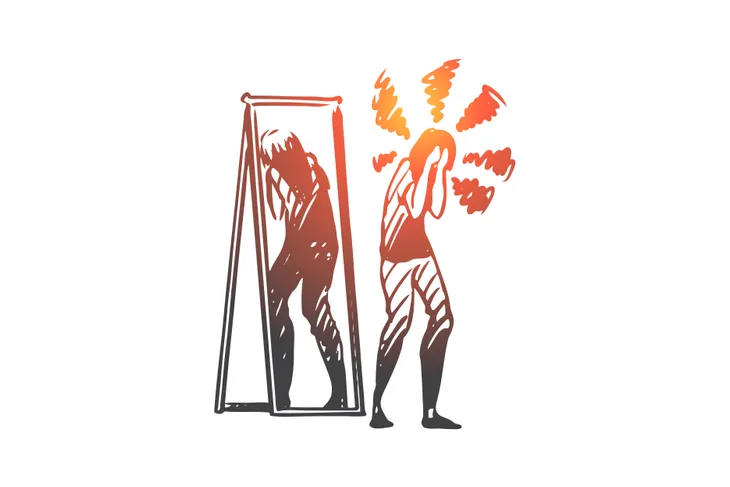An inferiority complex is when a person struggles with feelings of inadequacy and feeling inferior or deficient to others. It can be quite debilitating. While it’s normal to doubt yourself or lack confidence once in a while, when these feelings and negative mindsets don’t go away and start impacting your everyday life, then it’s important to find a solution.
There are different types of coping mechanisms people with this mindset can do to improve their way of thinking. Here’s what you need to know about an inferiority complex.
What’s an Inferiority Complex?
To have an inferiority complex means you have an unrealistic feeling of generalized inadequacy. This negative self-image impacts your life on a daily basis and it’s a mindset that can potentially snowball into a form of distress. According to Everyday Health, this mindset was introduced in 1907 by psychologist Alfred Adler and involves “psychological symptoms that interfere with normal activities.”
Signs You May Have an Inferiority Complex
There are some telltale signs of an inferiority complex. These are common symptoms often associated to people with an inferiority complex:
- Consistently focusing on upsetting thoughts
- Shutting down out of guilt, shame, embarrassment or sense of defeat
- Withdrawing from coworkers, colleagues or family
- A sense of responsibility for other people’s failures
- Seeking attention and validation by pretending to be sick or depressed
- Avoiding competition where efforts might be compared to others

Unexpected Symptoms of an Inferiority Complex
While timidness and lack of confidence might not be surprising symptoms of an inferiority complex, there are others that can mask this mindset. Not everyone with an inferiority complex will appear down on themselves or lack confidence on the outside. Sometimes, a person with this feeling can also seem overly confident. Some of the signs include:
- High competitiveness
- Perfectionism
- Very sensitive to criticism or compliments
- Attention-seeking
- Constantly finding fault in others
- Has difficulty with admitting mistakes
- Feeling good when others are doing worse than you
Now that we know what an inferior complex looks like, let’s look at some ways you can fight it off.

Evaluate Your Way of Thinking
People with an inferiority complex tend to have an all-or-nothing way of thinking, so all things are either good or bad. They tend to focus on the negatives, jump to conclusions and confuse feelings or beliefs with facts. Everyday Health says Cognitive Behavioral Therapy (CBT) can help with this.
While a person might feel like a total failure, they could just be experiencing a cognitive distortion. These are thought patterns that negatively impact a person’s self esteem. CBT involves teaching people to take a step back, examine the negative thoughts and feelings, and gradually change them over time by checking their validity — perhaps you’re really just experiencing a cognitive distortion.

Look For Good in People
For people that tend to compare themselves to others and feel inferior, it can help to look for the good them instead. Med Life explains how you should start by understanding why you feel inferior to them. It could be their appearance, personality, or they have many accomplishments. Then recognize that you carry desirable traits as well.
Rather than look down on them or have jealous feelings, you can focus on the good and befriend them for their qualities instead.
Consider Who You Surround Yourself With
It might be time to reconsider your friends and acquaintances if they continuously make you feel inferior. Identify people in your life who stir up feelings of self doubt or sadness. If you’re unable to befriend them and turn the relationship into something more positive, it might be best to avoid the people who make you feel low and occupy more of your time with others instead.
Adlerian Therapy
The Adlerian approach is something a therapist might use to help patients work through an inferiority complex. This form of therapy aims to clarify a person’s perception of their childhood and reframe them to reflect a more accurate perspective on their abilities.
Everyday Health also explains how this four-stage therapy can help a person identify what’s important to them and develop healthier ways of thinking about their problems.
Start Journaling or Meditation
To get more in-tune with yourself, Talk Space recommends journaling and meditation. These two activities allow you to work through your thoughts and emotions in a private way. After getting to know your thought patterns, this can hopefully help you begin working towards a “healthier and more affirming mindset.”
Find a Therapist
It’s a good idea to seek professional help if you’re unable to work through an inferior complex by yourself. With a therapist, you can learn how your inferior complex may be stemming from childhood experiences, adulthood, personality traits, cultural messages received about perceived inadequacies or a combination of these factors.
A psychologist can help you identify the root of your low self esteem and suggest the best course of action to let go of those feelings.





